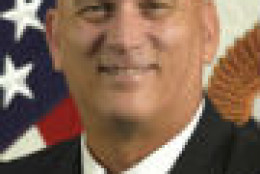Army
-
On this week's edition of On DoD, an update on the Army's efforts to modernize its tactical networks.
October 22, 2014 -
The Army's network integration exercises will emphasize more lab testing and less integration during the NIE itself. Future NIEs will be biased toward programs of record, not off-the-shelf technologies.
October 22, 2014 -
The churn among federal CIOs and others in the IT community has been uncommonly high over the last year.
October 17, 2014 -
Army Chief of Staff Gen. Ray Odierno says new Army Operating Concept stresses flexibility and sustainability to combat a wide variety of enemies across a wide swath of domains.
October 15, 2014 -
For now, push-ups and math scores are the main methods the Army uses to screen potential recruits. But officials say they are studying measures that take a "whole person" approach identifying future soldiers.
October 15, 2014 -
Sometimes you have a plan but contingencies come up and force you to change. That's the situation the Army finds itself in. The service is taking a close look at how budget constraints and blossoming global conflicts are forcing it to adjust. Army Lt. Gen. Michael Williamson is military deputy to the Assistant Secretary of the Army for Acquisition, Logistics and Technology and director of Acquisition Career Management. He spoke with Emily Kopp at the Association of the U.S. Army Expo.
October 14, 2014 -
Only a few weeks ago, Army leadership was planning to shrink its force to levels unseen since before World War II. But that was before Islamic State terrorists threatened to take over Iraq and Syria, before Russia invaded Ukraine and before the U.S. began deploying 4,000 troops to West Africa to help control the Ebola outbreak. Now the Army's Chief of Staff, Gen. Ray Odierno, suggests the Army and political leaders need to rethink their plans. He spoke with Emily Kopp at the Association of the Army Expo about the Army's next steps.
October 14, 2014 -
As part of a project dubbed Command Post 2025, the Army wants to begin running complex modeling and simulation programs on the battlefield, using low-power devices in austere conditions.
October 10, 2014 -
Janet Hill, principal at Hill Family Advisors, sits down with the Women of Washington radio show to discuss the importance of diversity in American corporations and her famous Wellesley classmate - Hillary Clinton.
October 08, 2014 -
The Department of Defense expects a longer and possibly a more costly withdrawal of Army and Marine Corps equipment from Afghanistan than in Iraq, according to a Government Accountability Office report released on Tuesday.
October 02, 2014 -
The Army is the latest federal organization to lay out a career path for its cybersecurity leaders. Career Field 17 will offer soldiers that career path. Advocates of professionalizing the cyber workforce believe that would feed talent pipelines with the people agencies need to succeed. Lt. Col. Sean Kern is cyberspace operations officer, and a graduate student at the Joint Advanced Warfighting School at Joint Forces Staff College at the National Defense University. On In Depth with Francis Rose, he said the main cyber problem right now is a people problem.
October 01, 2014 -
The Army's Intelligence and National Security Command made awards to 21 firms under an indefinite-delivery contract called Global Intelligence Support Services. This story is part of Jared Serbu's Inside the DoD Reporter's Notebook.
September 29, 2014 -
The leader of the Army's new Cyber Center of Excellence says his job is not merely to build the cyber workforce, but to integrate that up-and-coming capability with the Army's existing signals and intelligence disciplines.
September 26, 2014 -
While deployed in Afghanistan, Christopher Ciampa allegedly stole more than one million gallons of fuel for resale on Afghanistan's black market.
September 26, 2014 -
Cyber operations is about the only area of the DoD budget that hasn't been subject to cuts. But the new leader of the Army's Cyber Center of Excellence says that doesn't mean the Army can grow its newest military discipline in isolation. Federal News Radio DoD reporter Jared Serbu has the details.
September 25, 2014







